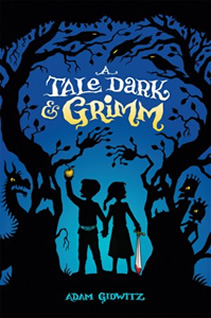"You see, to find the brightest wisdom one must pass through the darkest zones.
And through the darkest zones there can be no guide.
No guide, that is, but courage."
Adam Gidwitz, A Tale Dark & Grimm
It should not come as a shock, dear reader, that SC is a huge fan of dark fantasy. I believe I have also mentioned that it is not something I was interested in as a young reader, so it has been a learning journey as I attempt to find quality children's literature in that genre. A few weeks ago, we stumbled across a Halloween-themed display at the bookstore, and having just finished the Elsewhere series and needing a new audiobook read-aloud, I told SC to take a look at the books on the display, read the back covers, and pick something a bit spooky. Well, she did. Not only is this book spooky, but creepy and grotesque as well. And awesome and well written and wonderful.
I was happily shocked by A Tale Dark & Grimm and Gidwitz's authorial style. The novel is a retelling of a few of Grimm's fairytales, changed to interweave Hansel and Gretel as the main characters through each, juxtaposed with Gidwitz himself through authorial intrusion commenting on what is about to happen, or what has just happened, in the story he constantly reminds the reader he is retelling. At first, this intrusion is comical, with Gidwitz warning the reader that the tales are "as violent and bloody as you can imagine" and stating that if that sort of thing bothers you "we should probably stop right now." He also is constantly asking the reader to make sure there are no "little children" around because they will be scared and have nightmares. To be sure, this book is scary, with blood and gore, death, untrustworthy and selfish kids and adults (including parents), and I would not recommend it for a child who scares easily or who might not be able to see through this to understand the intentional theme throughout.
It is this intentional theme that eventually evolves from the comedy as the story progresses, and Gidwitz becomes a side-kick (not a guide, which he specifically points out would not bring about the desired result of wisdom and understanding), seeing the story with different eyes and bringing about the palpability of the theme. For a children's book, there is an incredibly heavy theme, one that encompasses the brokenness of humanity, a recognition of that brokenness, purposeful change for the better, and finally a complete understanding of the brokenness in others, then forgiving and shouldering the burdens of said others in order to create a better world. Halfway through the novel, having shown Hansel to be selfish in some of the worst ways, Gidwitz intrudes to explain:
"There is a certain kind of pain that can change you. Even the strongest sword, when placed in a raging fire, will soften and bend and change its form. So it was with Hansel. The fire of guilt and shame was just that hot.
Trust me on this one. I know this from personal experience. I hope that you never will, but, since you're a person, and therefore prone to making horrible, soul-splitting mistakes, you probably will one day know what this kind of guilt and shame feels like. And when that time comes, I hope you have the strength, as Hansel had, to take advantage of the fire and reshape your own sword."Again, for a children's book, this is deep. Gidwitz also writes in a way that there is no denying his intentions with his theme. One cannot read this book and not come away with an understanding that people are broken, but people can rise above that brokenness, and that others should both forgive and help shoulder the burdens of brokenness out of love, no matter what. He even creates a running conversation of this concept throughout the novel, breaking apart the term "understanding" and fashioning it into the concept of "under-standing...standing beneath them. Supporting them. Bearing their troubles and their pains on my shoulders." It appears over and over, this concept of under-standing, and examples of what that looks like in various situations.
In the end, in spite of the gore, blood and disgust at a very accurate portrayal of humanity, this book is worth reading because of the message Gidwitz successfully imparts. As I said above, if your child is sensitive to these things, I would wait until he/she is a bit older, but I would definitely add this to a long list of to-be-read books for the future. There are two other books in the series, and I have high hopes that they are just as excellent in terms of writing and intentionality.
**This post contains affiliate links. Please read my disclosure statement.



No comments:
Post a Comment